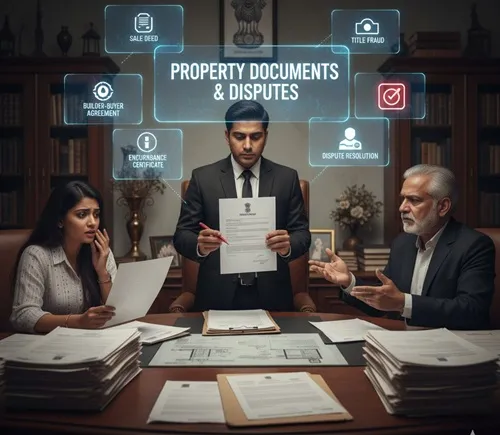Property Documents & Disputes: For Buyers and Sellers

Whether you're buying, selling, or inheriting property—knowing key documents protects you from fraud, double sale, and ownership fights later. Below are the most vital documents and answers to common legal questions people face while dealing with property.
Key Property Documents You Must Know
1. Sale Deed – Legal Proof of Ownership
- A sale deed is the final document that transfers ownership from the seller to the buyer.
- It includes names, addresses, property details, sale price, date, and signatures.
- Must be registered at the Sub-Registrar Office to be legally valid.
2. Land Registration—Official Government Record
- Land registration means recording the property in the government land records.
- It confirms ownership, prevents fraud, and is required for resale or inheritance.
- You'll need the sale deed, ID proofs, stamp duty payment proof, and witness signatures.
3. Partition Deed – For Family or Co-owned Property
- When multiple people jointly own property (siblings, heirs, partners), a partition deed defines who owns which share.
- It can be done mutually or through court if there's a dispute.
- Registration is highly recommended to make it legally binding.
State-wise Property Registration Portals
| State/UT | Online Registration Portal | Land Record (Bhulekh) Portal |
|---|---|---|
| Delhi | https://doris.delhigovt.nic.in/ | https://dlrc.delhi.gov.in/ |
| Maharashtra | https://efilingigr.maharashtra.gov.in/ereg/MainForm.aspx | https://mahabhumi.gov.in/mahabhumilink |
| Uttar Pradesh | https://igrsup.gov.in/igrsup/defaultAction.action | https://upbhulekh.gov.in/bhulekh_login/#/home |
| Karnataka | https://igr.karnataka.gov.in/english | https://landrecords.karnataka.gov.in |
| Tamil Nadu | https://eservices.tn.gov.in/eservicesnew/home.html | — |
| Haryana | https://jamabandi.nic.in/defaultpages/default | https://jamabandi.nic.in |
| Telangana | https://registration.telangana.gov.in/propertyRegistration.htm | https://dharaniportal.com/ |
| West Bengal | https://wbregistration.gov.in | https://banglarbhumi.gov.in |
FAQs on Property Documentation and Disputes
-
1. What is a sale deed, and why is it important?
-
It's a registered document that proves you legally own the property. Without it, you're not recognised as the owner in the eyes of the law.
-
2. What details are included in a sale deed?
-
Names & addresses of buyer and seller
Property boundaries and description
Sale price and payment terms
Date of transfer and conditions
Signatures of both parties and witnesses -
3. Is registration of the Sale Deed mandatory?
-
Yes. Every Sale Deed must be registered under the Registration Act, 1908, at the local Sub-Registrar Office.
-
4. What is land registration, and why is it needed?
-
It records the transaction in official government land records—protecting you from fake claims and ensuring future resale or mutation.
-
5. What is stamp duty, and who pays it?
-
Stamp duty is a state government tax on property transfer. Usually paid by the buyer unless agreed otherwise.
-
6. Can I sell property without registration?
-
No. Without a registered Sale Deed, the ownership isn't legally transferred, and resale is invalid.
-
7. What happens if I don't register a Sale Deed?
-
The buyer doesn't get legal ownership and can face future disputes or loss of possession.
-
8. What is a Partition Deed?
-
It's a document that legally divides a jointly owned property so that each co-owner gets a specific share.
-
9. When is a Partition Deed required?
-
When siblings or co-owners want to separate their shares in inherited or jointly purchased property.
-
10. How can partition be done legally?
-
By Agreement: all co-owners mutually agree and register a deed.
By Court Decree: if there's a dispute, the court orders the division. -
11. Can inherited property be registered in my name?
-
Yes. Through mutation—updating land records with the heir's name using the will, succession certificate, or legal heir certificate.
-
12. What is the difference between a Sale Agreement and a Sale Deed?
-
Sale Agreement: promise to sell (before full payment/registration).
Sale Deed: final proof of sale and ownership transfer. -
13. What documents are needed at the Sub-Registrar Office?
-
Original Sale Deed
Identity/address proofs of both parties
PAN card
Stamp duty receipt/e-stamp
Passport-size photos
Two witnesses' ID proofs -
14. Can property registration be done online?
-
Yes, in most states—initial steps can be done online, but both parties must visit the Sub-Registrar for final signing.
-
15. What is a Mutation Certificate and why is it important?
-
It's an update in municipal/land records showing the new owner's name. Necessary for paying property tax and future transfers.
-
16. Can I check property ownership online?
-
Yes, many states provide Bhulekh (land record) portals for ownership verification.
-
17. What happens if co-owners don't agree to partition?
-
A partition suit can be filed in the civil court seeking legal division.
-
18. Is a lawyer necessary for property documentation?
-
Advisable. A property lawyer ensures documents are clear, authentic, and dispute-proof.
-
19. Can I use one deed format for all states?
-
No. Stamp duty, fees, and online registration portals vary by state.
-
20. How can I verify a property before buying?
-
Check title deed and encumbrance certificate (EC)
Visit land records portal
Ask for latest tax receipts and approved layout plan
Add new comment